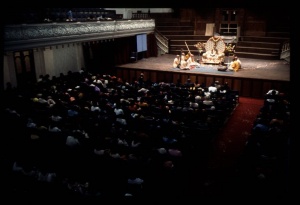SB 6.14.50-51: Difference between revisions
m (1 revision(s)) |
(Vanibot #0054 edit - transform synonyms into clickable links, which search similar occurrences) |
||
| (One intermediate revision by one other user not shown) | |||
| Line 1: | Line 1: | ||
{{info | {{info | ||
|speaker= | |speaker=Śukadeva Gosvāmī | ||
|listener=King | |listener=King Parīkṣit | ||
}} | }} | ||
[[Category:Srimad-Bhagavatam - Canto 06 Chapter 14]] | |||
[[Category:Bhagavatam Verses Spoken by Sukadeva Gosvami - Vanisource|061450]] | |||
<div style="float:left">'''[[Srimad-Bhagavatam]] - [[SB 6|Sixth Canto]] - [[SB 6.14: King Citraketu's Lamentation|Chapter 14: King Citraketu's Lamentation]]'''</div> | |||
<div style="float:right">[[File:Go-previous.png|link=SB 6.14.49]] '''[[SB 6.14.49]] - [[SB 6.14.52]]''' [[File:Go-next.png|link=SB 6.14.52]]</div> | |||
{{RandomImage}} | |||
==== TEXTS 50-51 ==== | ==== TEXTS 50-51 ==== | ||
<div class="verse"> | |||
:śrutvā mṛtaṁ putram alakṣitāntakaṁ | |||
:vinaṣṭa-dṛṣṭiḥ prapatan skhalan pathi | |||
:snehānubandhaidhitayā śucā bhṛśaṁ | |||
:vimūrcchito 'nuprakṛtir dvijair vṛtaḥ | |||
:papāta bālasya sa pāda-mūle | |||
:mṛtasya visrasta-śiroruhāmbaraḥ | |||
:dīrghaṁ śvasan bāṣpa-kaloparodhato | |||
:niruddha-kaṇṭho na śaśāka bhāṣitum | |||
papāta bālasya sa pāda-mūle | |||
mṛtasya visrasta-śiroruhāmbaraḥ | |||
dīrghaṁ śvasan bāṣpa-kaloparodhato | |||
niruddha-kaṇṭho na śaśāka bhāṣitum | |||
</div> | </div> | ||
| Line 21: | Line 27: | ||
==== SYNONYMS ==== | ==== SYNONYMS ==== | ||
<div class="synonyms"> | |||
<div | ''[//vanipedia.org/wiki/Special:VaniSearch?s=śrutvā&tab=syno_o&ds=1 śrutvā]'' — hearing; ''[//vanipedia.org/wiki/Special:VaniSearch?s=mṛtam&tab=syno_o&ds=1 mṛtam]'' — dead; ''[//vanipedia.org/wiki/Special:VaniSearch?s=putram&tab=syno_o&ds=1 putram]'' — the son; ''[//vanipedia.org/wiki/Special:VaniSearch?s=alakṣita&tab=syno_o&ds=1 alakṣita]-[//vanipedia.org/wiki/Special:VaniSearch?s=antakam&tab=syno_o&ds=1 antakam]'' — the cause of death being unknown; ''[//vanipedia.org/wiki/Special:VaniSearch?s=vinaṣṭa&tab=syno_o&ds=1 vinaṣṭa]-[//vanipedia.org/wiki/Special:VaniSearch?s=dṛṣṭiḥ&tab=syno_o&ds=1 dṛṣṭiḥ]'' — unable to see properly; ''[//vanipedia.org/wiki/Special:VaniSearch?s=prapatan&tab=syno_o&ds=1 prapatan]'' — constantly falling down; ''[//vanipedia.org/wiki/Special:VaniSearch?s=skhalan&tab=syno_o&ds=1 skhalan]'' — slipping; ''[//vanipedia.org/wiki/Special:VaniSearch?s=pathi&tab=syno_o&ds=1 pathi]'' — on the road; ''[//vanipedia.org/wiki/Special:VaniSearch?s=sneha&tab=syno_o&ds=1 sneha]-[//vanipedia.org/wiki/Special:VaniSearch?s=anubandha&tab=syno_o&ds=1 anubandha]'' — because of affection; ''[//vanipedia.org/wiki/Special:VaniSearch?s=edhitayā&tab=syno_o&ds=1 edhitayā]'' — increasing; ''[//vanipedia.org/wiki/Special:VaniSearch?s=śucā&tab=syno_o&ds=1 śucā]'' — by lamentation; ''[//vanipedia.org/wiki/Special:VaniSearch?s=bhṛśam&tab=syno_o&ds=1 bhṛśam]'' — greatly; ''[//vanipedia.org/wiki/Special:VaniSearch?s=vimūrcchitaḥ&tab=syno_o&ds=1 vimūrcchitaḥ]'' — becoming unconscious; ''[//vanipedia.org/wiki/Special:VaniSearch?s=anuprakṛtiḥ&tab=syno_o&ds=1 anuprakṛtiḥ]'' — followed by ministers and other officers; ''[//vanipedia.org/wiki/Special:VaniSearch?s=dvijaiḥ&tab=syno_o&ds=1 dvijaiḥ]'' — by learned ''brāhmaṇas''; ''[//vanipedia.org/wiki/Special:VaniSearch?s=vṛtaḥ&tab=syno_o&ds=1 vṛtaḥ]'' — surrounded; ''[//vanipedia.org/wiki/Special:VaniSearch?s=papāta&tab=syno_o&ds=1 papāta]'' — fell down; ''[//vanipedia.org/wiki/Special:VaniSearch?s=bālasya&tab=syno_o&ds=1 bālasya]'' — of the boy; ''[//vanipedia.org/wiki/Special:VaniSearch?s=saḥ&tab=syno_o&ds=1 saḥ]'' — he (the King); ''[//vanipedia.org/wiki/Special:VaniSearch?s=pāda&tab=syno_o&ds=1 pāda]-[//vanipedia.org/wiki/Special:VaniSearch?s=mūle&tab=syno_o&ds=1 mūle]'' — at the feet; ''[//vanipedia.org/wiki/Special:VaniSearch?s=mṛtasya&tab=syno_o&ds=1 mṛtasya]'' — of the dead body; ''[//vanipedia.org/wiki/Special:VaniSearch?s=visrasta&tab=syno_o&ds=1 visrasta]'' — scattered; ''[//vanipedia.org/wiki/Special:VaniSearch?s=śiroruha&tab=syno_o&ds=1 śiroruha]'' — hair; ''[//vanipedia.org/wiki/Special:VaniSearch?s=ambaraḥ&tab=syno_o&ds=1 ambaraḥ]'' — and dress; ''[//vanipedia.org/wiki/Special:VaniSearch?s=dīrgham&tab=syno_o&ds=1 dīrgham]'' — long; ''[//vanipedia.org/wiki/Special:VaniSearch?s=śvasan&tab=syno_o&ds=1 śvasan]'' — breathing; ''[//vanipedia.org/wiki/Special:VaniSearch?s=bāṣpa&tab=syno_o&ds=1 bāṣpa]-[//vanipedia.org/wiki/Special:VaniSearch?s=kalā&tab=syno_o&ds=1 kalā]-[//vanipedia.org/wiki/Special:VaniSearch?s=uparodhataḥ&tab=syno_o&ds=1 uparodhataḥ]'' — due to crying with tearful eyes; ''[//vanipedia.org/wiki/Special:VaniSearch?s=niruddha&tab=syno_o&ds=1 niruddha]-[//vanipedia.org/wiki/Special:VaniSearch?s=kaṇṭhaḥ&tab=syno_o&ds=1 kaṇṭhaḥ]'' — having a choked voice; ''[//vanipedia.org/wiki/Special:VaniSearch?s=na&tab=syno_o&ds=1 na]'' — not; ''[//vanipedia.org/wiki/Special:VaniSearch?s=śaśāka&tab=syno_o&ds=1 śaśāka]'' — was able; ''[//vanipedia.org/wiki/Special:VaniSearch?s=bhāṣitum&tab=syno_o&ds=1 bhāṣitum]'' — to speak. | ||
</div> | </div> | ||
| Line 29: | Line 34: | ||
==== TRANSLATION ==== | ==== TRANSLATION ==== | ||
<div class="translation"> | |||
<div | |||
When King Citraketu heard of his son's death from unknown causes, he became almost blind. Because of his great affection for his son, his lamentation grew like a blazing fire, and as he went to see the dead child, he kept slipping and falling on the ground. Surrounded by his ministers and other officers and the learned brāhmaṇas present, the King approached and fell unconscious at the child's feet, his hair and dress scattered. When the King, breathing heavily, regained consciousness, his eyes were tearful, and he could not speak. | When King Citraketu heard of his son's death from unknown causes, he became almost blind. Because of his great affection for his son, his lamentation grew like a blazing fire, and as he went to see the dead child, he kept slipping and falling on the ground. Surrounded by his ministers and other officers and the learned brāhmaṇas present, the King approached and fell unconscious at the child's feet, his hair and dress scattered. When the King, breathing heavily, regained consciousness, his eyes were tearful, and he could not speak. | ||
</div> | </div> | ||
__NOTOC__ | |||
<div style="float:right; clear:both;">[[File:Go-previous.png|link=SB 6.14.49]] '''[[SB 6.14.49]] - [[SB 6.14.52]]''' [[File:Go-next.png|link=SB 6.14.52]]</div> | |||
__NOTOC__ | |||
__NOEDITSECTION__ | |||
Latest revision as of 22:30, 18 February 2024

A.C. Bhaktivedanta Swami Prabhupada
TEXTS 50-51
- śrutvā mṛtaṁ putram alakṣitāntakaṁ
- vinaṣṭa-dṛṣṭiḥ prapatan skhalan pathi
- snehānubandhaidhitayā śucā bhṛśaṁ
- vimūrcchito 'nuprakṛtir dvijair vṛtaḥ
- papāta bālasya sa pāda-mūle
- mṛtasya visrasta-śiroruhāmbaraḥ
- dīrghaṁ śvasan bāṣpa-kaloparodhato
- niruddha-kaṇṭho na śaśāka bhāṣitum
SYNONYMS
śrutvā — hearing; mṛtam — dead; putram — the son; alakṣita-antakam — the cause of death being unknown; vinaṣṭa-dṛṣṭiḥ — unable to see properly; prapatan — constantly falling down; skhalan — slipping; pathi — on the road; sneha-anubandha — because of affection; edhitayā — increasing; śucā — by lamentation; bhṛśam — greatly; vimūrcchitaḥ — becoming unconscious; anuprakṛtiḥ — followed by ministers and other officers; dvijaiḥ — by learned brāhmaṇas; vṛtaḥ — surrounded; papāta — fell down; bālasya — of the boy; saḥ — he (the King); pāda-mūle — at the feet; mṛtasya — of the dead body; visrasta — scattered; śiroruha — hair; ambaraḥ — and dress; dīrgham — long; śvasan — breathing; bāṣpa-kalā-uparodhataḥ — due to crying with tearful eyes; niruddha-kaṇṭhaḥ — having a choked voice; na — not; śaśāka — was able; bhāṣitum — to speak.
TRANSLATION
When King Citraketu heard of his son's death from unknown causes, he became almost blind. Because of his great affection for his son, his lamentation grew like a blazing fire, and as he went to see the dead child, he kept slipping and falling on the ground. Surrounded by his ministers and other officers and the learned brāhmaṇas present, the King approached and fell unconscious at the child's feet, his hair and dress scattered. When the King, breathing heavily, regained consciousness, his eyes were tearful, and he could not speak.